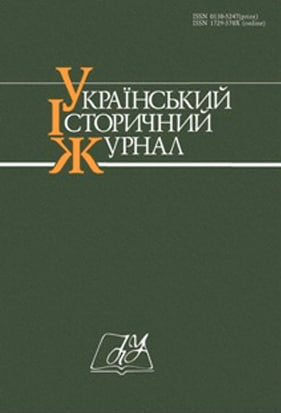Crimes Against Cultural Heritage: the Einsatzstab Reichsleiter Rosenberg and the Nuremberg Trial
DOI:
https://doi.org/10.15407/uhj2020.01.143Ключові слова:
World War II, Nuremberg Trials, cultural property, Einsatzstab Reichsleiter RosenbergАнотація
The purpose of the research is analyse the role and significance of documents of the Special Command Force of Reichsleiter Alfred Rosenberg (Einsatzstab Reichsleiter Rosenberg), considered at the Nuremberg Trial as sources for its activities in the occupied European countries in the field of confiscation and transfer of cultural property (art, other museum collections, libraries and archival collections).
The methodology of the research is based on the principles of historicism, scientificity and comprehensiveness. The following general historical methods were used: historical- comparative, retrospective, methods of the historiographic and source study analyses.
The scientific novelty. The location of the ERR documents in the general body of documentary evidence, involved by the prosecution as a source of coverage of Nazi looting of cultural property in the territories, occupied by Nazi Germany during World War II, as well as the problems and prospects of further cultural issues, values and archival search, are described.
Conclusions. Particular attention was paid to documents relating to crimes against culture, since in the course of preparation for the trial they were referred to as crimes related to property loss. But cultural crimes mean not only the destruction, damage, or displacement of cultural objects, but also the spiritual heritage of the occupied countries. Reports, correspondence of the ERR itself, as well as the materials of interrogations of witnesses of this looting activity are briefly covered, among which were both employees of the ERR and various Nazi state and military figures engaged in the looting of cultural property in the occupied countries. The documents of the Special Command Force of Reichsleiter Alfred Rosenberg were involved in a small number of cases, mainly by Western Allies and the Soviet side’s allegations of cultural property losses were based first on aggregate data on from the acts of the Extraordinary State Commission for Ascertaining and Investigating Crimes Perpetrated by the German-Fascist Invaders and their Accomplices. For example, the consequences of the operations of the Special Command Force of Reichsleiter Alfred Rosenber were attributed to the loss of cultural property to which it was not involved. It was found also that the role of other Nazi structures and organizations involved in the looting of cultural property was presented slightly during the process. The problems and prospects for further research on the issue of displaced and lost cultural property and archival search were also highlighted, especially the search for new documents in the archives of other Nazi organizations of the World War II.


